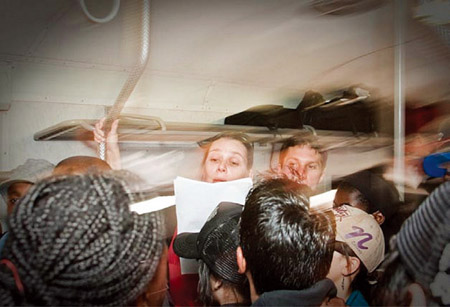
Researcher: Vaughn Sadie Region: Africa
MADEYOULOOK is a Johannesburg based art collective, consisting of Nare Mokgotho and Molemo Moiloa. The collective ran Sermon on the Train between 2009 -2011, a project that looked to push notions of public ownership, interaction and academia into a new direction by facilitating University of the Witwatersrand lectures on the train to Soweto. MAD- EYOULOOK saw the project as not being a study of the quotidian but rather as an experiment exploring human interaction and access to knowledge.
The train in Johannesburg and its surrounds is the cheapest mode of public transport, and is predominantly used by the working class and the poor. The train service under the previous political system of apartheid was used as a means of bringing in a large black workforce from the edge of the urban centers, where they had been resettled under the Group Areas Act in 1950. The act assigned racial groups to different residential and business sections in urban areas as a means of keeping them segre- gated. Despite the first democratic election in 1994 this state induced segregation (no longer enforced), the legacy of spatial segregation still informs contemporary usage of public transport, as this historical separa- tion still exists mainly through economic determinants.
The Collective cite their own interest in trains as dynamic public space with multiple users shaping and defining it daily, with their own notion of place constantly being negotiated as they find themselves in a state of transience that moves between Johannesburg and Soweto. According to MADEYOULOOK the players that impact on this negation of place vary from:
Children whose massive backpacks reach their knees... small-scale entre- preneurs (who) walk from coach to coach with overloaded shopping baskets of absolutely everything you need... Every now and again there might be a performance, drums, dancing, ibeshu and all. And then of course there is church. You don’t always know there is one on the coach you get on and two young men might leap onto your coach, Bibles in hands, a station or two after you get on. There might be singing, other people in the train might take part, preaching might take the form of an elongated relay of pacing and ‘amen, hallelujahs’ till you get to your destination. (MADEYOULOOK, 2011, 67)
Sermon on the Train, brought a formal lecture series on the Metro Rail, that “took as its point of departure the ordinariness of train preaching, of sharing enlightenment, of communal understanding and its position slap bang in the centre of isolation” (ibid). The lectures were given by three different academics: Anitra Nettleton, Kirsten Doermann and Isabel Hofmeyer about academic subjects, to wide variety of commuters. These lectures were intended to ‘take knowledge to the people’ (ibid), not because ‘the people needed it’ but because those who produced it did – as a way of calling to account the isolation of academia and encourag- ing the exploration of possibilities for new ways of making and sharing knowledge
The consideration for the award is that Sermons on a Train is small and contained, and it is not prefaced with a transformative agenda. The project understands the context that it works in, and carefully places itself between clearly defined conceptual dichotomies. The project under- stands both its intended publics: academics and public transport commuter and considers the way they come together. It also challenges the notion of public art as a grand spectacle by showing an appreciation of ‘what’s there, everyday’ and highlighting the vast social distances that still exist in a city like Johannesburg. Sermon on the Train took on the fraught clash of connectedness and separation that is embodied in the train, engaged it, yet did not change it, but rather highlighted it. It explores place-making as performative, located within the important moment of exchange and interaction between two diverse and transient publics. The emphasis is placed on the ephemeral through temporary interventions as a possibility - a new form of place-making.
The success of the project is that it addresses notions of public, by challenging academia embedded within public institutions to make the knowledge they generate public; not through publication and peer review, but through public delivery. Utilising a normative convention that has emerged through necessity over decades and are rooted in the every- day. |